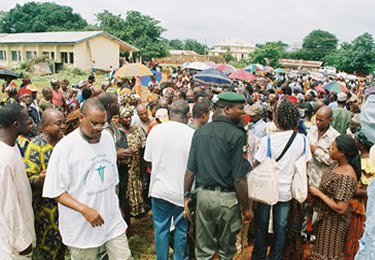All over the USA and UK, the annual mobilisation of Nigerians to donate towards “Medical Missions”is in full swing.
The long term goal of medical missions should be to make missions unnecessary!
At another recent fund raiser; a dinner held in New Jersey, Professor Akinnaso who attended the event reports that the New Jersey chapter of the Association of Nigerian Physicians in the Americas is planning its next mission where they will be “Improving healthcare in Nigeria, one person at a time“. At the dinner, a speech by Dr. Ferdinand Ofodile, who is a clinical Professor of Surgery at Columbia University and Chief of Plastic Surgery at Harlem Hospital in New York compared the Nigerian health system to a foreigner’s first impression of Murtala Muhammed International Airport, where “chaos and urban decay come flying at visitors like paper scraps in a windstorm“. He went on to say that…
“If we want things to change, we in the Diaspora can no longer wait for the people at home. We must take the lead. We must be engaged in sufficient numbers and we must be prepared for the long haul…
Committing to doing this is no small matter. Nigerian doctors on medical missions have often paid with their lives. Last year the tragic story of Dr Enyi Okereke comes to mind. This colleague was, until his untimely death on 25 November, 2008, the Chairman of the ANPA New Jersey Chapter. He was in Enugu in Eastern Nigeria preparing to participate in a arthroscopic seminar with a team of colleagues at the University of Nigeria Teaching Hospital when he suddenly took ill, and there was not even the most basic functional resuscitation equipment available to save his life. He had been appointed to the Penn Faculty in 1993 where he was an assistant Professor of orthopedics and the Chief of Foot and Ankle Services at the University of Pennsylvania, Philadelphia, USA. His death was a loss to his family, the teaching hospital, Nigeria. Everyone loses because we have failed to do the basics.
Dr Kpaduwa the President of the Association of Nigerian Physicians in the Americas described the incident graphically. ..
In fact it was on one of these selfless services to our nation, in Enugu awaiting the seminar on arthroscopic surgery that death cruelly snatched him (Enyi) away from us. He was first carried down to the lobby of the hotel that he was staying at when the heart attack struck. A taxi was flagged down to carry him to the nearest hospital. There are no emergency response systems in Enugu, no ambulances, no paramedics to administer crucial first aid to a heart attack victim. There was no emergency room to act as second response; no clot busters’ in the hospital, and no cardiac catheterization lab for crucial diagnoses. Our friend was aware of these inadequacies. He had to call for help. He picked up his phone and called his dear wife, who was thousands of miles away. He must have seen the worst case scenario coming.”
If this can happen to Enyi – what hope do we or any of our family members have when confronted with medical emergencies in Nigeria.
To those that commit their time, energy and resources to do the little that they can do….we say thank you, as there are many others out there that really don’t care about the country from where they got a medical education….virtually for free. But also, I wonder if we are missing a trick with missions. The natural instinct that we all have is to try and solve problems ourselves. Organising a health care system to truly serve the people is a complex problem (as we are learning from the USA). The solution, lies to a large extent in the government’s commitment and capacity to organise the system to serve the people. We challenge our colleagues to spend as much effort to advocate to the governments as they spend in directly providing care. Let us seek access and offer not just clinical services but expertise in management and leadership. Let competent Nigerians from all over the world speak up, show our governments and the world the state of affairs on the front-lines of our health care facilities.
This is the key to the success of the world’s largest medical NGO – MSF. They have a dual role that they take as seriously as the other…firstly providing emergency medical assistance to populations in danger and to act as a witness, speaking out, in private or in public about the plight of populations in danger.
We can and should do both!
What do you think about medical missions?
Never doubt that a small group of thoughtful committed people can change the world; indeed it is the only thing that ever has…Margaret Mead
